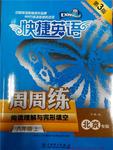题目内容
35. makes the peasant worker proud is he has set up a new bridge for the villagers.
A.What; that B.What; because C.That; what D.That; because
A
【解析】

 快捷英语周周练系列答案
快捷英语周周练系列答案As an English saying goes, “Laughter is the best medicine.” Until recently, few people took the saying seriously. Now however, doctors have begun to look into laughter and the effects it has on the human body. They have found that laughter really can improve people’s health.
Tests were carried out to study the effects of laughter on the body. People watched funny films while doctors checked their heart, blood pressure, breathing and muscles. It was found that laughter has similar effects to physical exercise. It increases blood pressure, makes the heart beat quicker and makes people breathe deeper; it also works several groups of muscles in the face, the stomach, and even the feet. If laughter exercises the body, it must be beneficial.
Other tests have shown that laughter appears to be able to reduce the effect of pain on the body. In one experiment doctors produced pain in groups of students who listened to different radio programs. The group that tolerated (忍耐) the pain for the longest time was the group which listened to a funny program. The reason why laughter can reduce pain seems to be that it helps to produce a kind of chemical in the brain which diminishes both stress and pain.
As a result of these discoveries, some doctors in the United States now hold laughter clinics, in which they help to improve their patients’ condition by encouraging them to laugh. They have found that even if their patients do not really feel like laughing, making them smile is enough to produce beneficial effects similar to those caused by laughter.
【小题1】Which of the following statements is NOT true according to the passage?
| A.Laughter can make people breathe deeper |
| B.Laughter can make you become old quickly. |
| C.Laughter helps to reduce pain. |
| D.Laughter, just like physical exercise, is good for our body. |
| A.delays | B.prevents | C.increases | D.reduces |
| A.Because they want to earn more money. |
| B.Because they think they will help the patients recover from illnesses. |
| C.Because they want to improve their patients’ health. |
| D.Because they want their patients to laugh more. |
| A.laugh as much as possible | B.watch more funny films |
| C.smile all the time | D.spend time in the laughter clinics |
| A.Both laughter and physical exercise are good for health. |
| B.Laughter clinics can help patients improve their condition. |
| C.Laughter can reduce the effect of pain. |
| D.Laughter is the best medicine. |
Attitude is an internal(内在的) state that influences the choices of personal action made by the individual(个人). Some researchers consider that attitudes come from differences between beliefs and ideas; others believe that attitudes come from emotional states. Here, we focus on the effects of attitudes upon behavior, that is, upon the choices of action made by the individual.
The kinds of actions taken by human beings are obviously influenced greatly by attitudes. Whether one listens to classical music or rock, whether one obeys the speed limit while driving, whether one encourages one’s husband or wife to express his or her own ideas-all are influenced by attitudes. These internal states are acquired(获得) throughout life from situations one is faced with in the home, in the streets, and in the school.
Of course, the course of action chosen by an individual in any situation will be largely determined by the particulars of that situation. An individual who has a strong attitude of obeying laws may drive too fast when he is in a hurry and no police cars in sight. A child who has a strong attitude of honesty may steal a penny when she thinks no one will notice. But the internal state which remains unchanged over a period of time, and which makes the individual behave regularly in a variety of situations, is what is meant by an attitude.
Attitudes are learned in a variety of ways. They can result from single events, as when an attitude toward snakes is acquired by an experience in childhood at the sudden movement of a snake. They can result from the individual’s experiences of success and pleasure, as when someone acquires a positive attitude toward doing crossword puzzles by being able to complete some of them. And frequently, they are learned by copying other people’s behavior, as when a child learns how to behave toward foreigners by observing the actions of his parents. Regardless of these differences, there is something in common in the learning and modification(修正) of attitudes.
1.According to the passage, attitudes .
A. come from different situations in one’s life
B. are largely affected by one’s behavior
C. remain unchanged in one’s daily life
D. could be chosen according to one’s will
2.The author uses the examples in Paragraph 3 to show .
A. people often make mistakes when they are not noticed
B. people with good attitudes may sometimes do bad deeds
C. particulars of a situation may influence an individual’s action
D. an individual may change his or her attitude fairly easily
3.Which of the following is TRUE about the learning of attitudes?
A. Attitudes are only learned through one’s success.
B. Attitudes learned in danger will last no more.
C. Copying others’ behavior is not a good idea.
D. Attitudes can be learned from one’s parents.
4.What would be the best title for the passage?
A. Differences of Attitudes. B. Nature(本质) of Attitude.
C. Choices of Attitudes. D. Changes of Attitude.